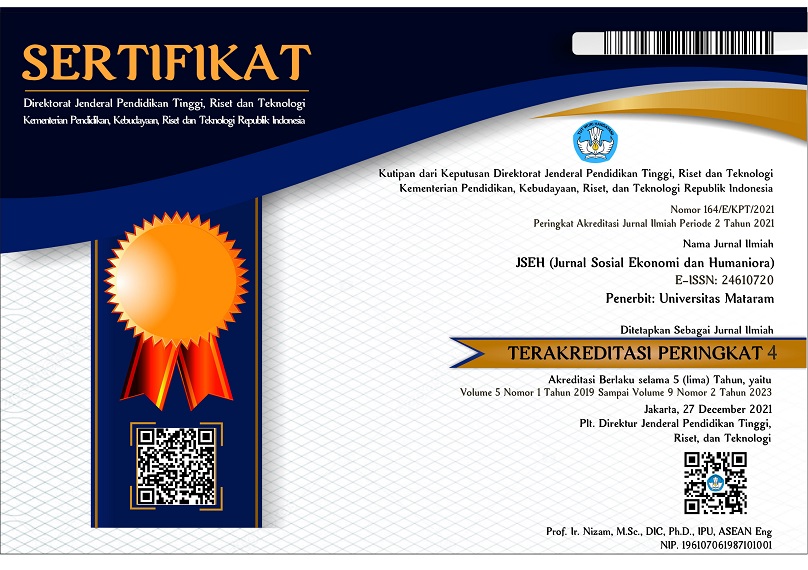Analisis Karakteristik Champion Desa Wisata Di Pulau Lombok
DOI:
https://doi.org/10.29303/jseh.v8i3.169Keywords:
Local Champion, Tourism Village, Empowerment, Community Participation, CharacteristicsAbstract
The roles of local champions in the development of tourism villages are central as they can act as agents of change as well as motivators for community participation in tourism development. This study aims to analyze the characteristics of the local champions in tourism villages. Data was collected from four tourism villages on Lombok Island. Interviews were conducted with seven informants who play roles as local champions in the tourism villages. The results of the interviews were transcribed and analyzed using the content analysis approach. The research found four main characteristics of a local champion, namely visioning, affiliating, altruistic and autonomous, which inspire a local champion to initiate a tourism business and motivate his/her communities to participate in the development of a tourism village. Providing training and mentoring to his/her community members, and having an orientation towards the sharing benefits and development are two bold characteristics that distinguish a local champion from an entrepreneur in general.This study provides recommendations for local government and other related institutions regarding appropriate approach and mechanisms in order to help stimulate the emergence of local champions in the tourism villages
References
Andereck, K. L., Valentine, K. M., Knopf, R. C., & Vogt, C. A. (2005). Residents' perceptions of community tourism impacts. Annals of Tourism Research, 32(4), 1056-1076.
Abas, S. A., & Abd Halim, N. A Conceptual Paper on the Role of Local Champion in Rural Tourism Destination in Malaysia.
Abas, S. A., Abd Halim, N., & Hanafiah, M. H. M. EXPLORING THE ROLE OF LOCAL CHAMPION IN COMMUNITY-BASED RURAL HOMESTAY IN MALAYSIA: A CASE OF HOMESTAY SUNGAI HAJI DORANI. Management, 7(27), 310-320.
Andereck, K. L., Valentine, K. M., Knopf, R. C., & Vogt, C. A. (2005). Residents' perceptions of community tourism impacts. Annals of Tourism Research, 32(4), 1056-1076.
Corbin, J., & Strauss, A. (2008). Basic of qualitative research (3rd ed). Thousand Oaks, California: Sage Publications.
Flick, U. (2004). Triangulation in qualitative research. A companion to qualitative research, 3, 178-183.
Gursoy, D., Jurowski, C., & Uysal, M. (2002). Resident attitudes: a structural modeling approach. Annals of Tourism Research, 29(1), 79-105.
Gursoy, D., & Rutherford, D. G. (2004). Host attitudes toward tourism: An Improved Structural Model. Annals of Tourism Research, 31(3), 495-516.
Hamzah, A., & Khalifah, Z. (2009). Handbook on Community Based Tourism:" how to Develop and Sustain CBT": APEC Secretariat.
Hartley, J., Benington, J., & Binns, P. (1997). Researching the roles of internal‐change agents in the management of organizational change. British Journal of Management, 8(1), 61-73.
Jurowski, C., & Gursoy, D. (2004). Distance effects on residents' attitudes toward tourism. Annals of Tourism Research, 31(2), 296-312. Retrieved from http://www.sciencedirect.com/science/article/B6V7Y-4BYNMRB-5/2/37ff9f2af28e06c14d59106cf9a0ad06
Kay, J., Dunne, E., & Hutchinson, J. (2010). Rethinking the values of higher education-students as change agents?
Lunenburg, F. C. (2010). Managing change: The role of the change agent. International journal of management, business, and administration, 13(1), 1-6.
Palmer, I., Dunford, R., & Akin, G. (2009). Ed 2. Managing Organizational Change-A Multiple Perspective Approach.
Russell, R., & Faulkner, B. (2004). Entrepreneurship, chaos and the tourism area lifecycle. Annals of Tourism Research, 31(3), 556-579.
Saufi, A., O'Brien, D., & Wilkins, H. (2014). Inhibitors to host community participations in tourism development in developing countries. Journal of Sustainable Tourism, 22(5), 801-820.
Saufi, A. (2017). Locals' participation and halal tourism: Lombok, Indonesia. In UNWTO & Griffith University (Eds.), Managing Growth and Sustainable Tourism Governance in Asia and The Pacific (pp. 61 - 65). Madrid, Spain: UNWTO & Griffith University.
Sharpley, R., & Vass, A. (2006). Tourism, farming and diversification: An attitudinal study. Tourism Management, 27(5), 1040-1052.
Scheyvens, R. (2003). Local involvement in managing tourism. In S. Singh, D. J. Timothy, & R. K. dowling (Eds.), Tourism in destination communities. Wallingford: CABI.
Tosun, C. (2006). Expected nature of community participation in tourism development. Tourism Management, 27(3), 493-504. Retrieved from http://www.sciencedirect.com/science/article/B6V9R-4FJXN1N-2/2/a471c94c83b5bd8fe2b2f82bc21da428
Tranggono, D., Nuryananda, P. F., & Putra, A. Y. T. (2021). Local Champion: Communication Characteristics in Community Empowerment Based on Local Innovation. JOSAR (Journal of Students Academic Research), 7(1), 72-84.
Voehl, F., & Harrington, H., J. (2016) Change Management Manage the Change or It Will Manage You.CRC Press: Taylor & Francis Group.
Weaver, D., & Lawton, L. (2014). Tourism Management (Fifth ed.). Milton QLD 4064: Wiley.
Williams, J., & Lawson, R. (2001). Community issues and resident opinions of tourism. Annals of Tourism Research, 28(2), 269-290.
Downloads
Published
How to Cite
Issue
Section
License

This work is licensed under a Creative Commons Attribution-NonCommercial 4.0 International License.








